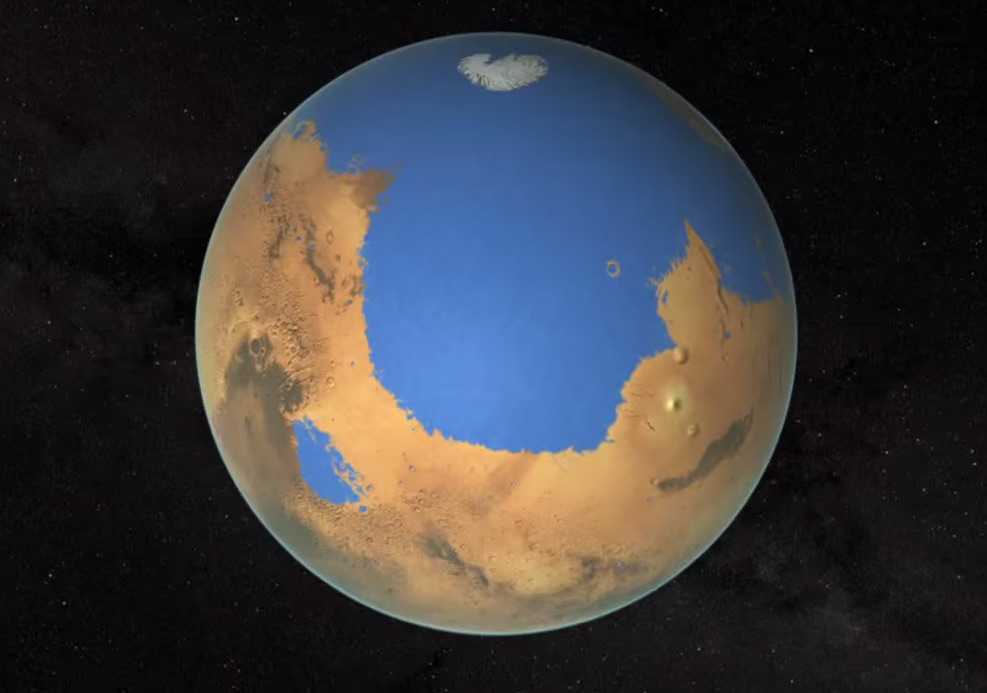Researchers working for the NASA space agency have announced that they've found evidence on Mars for an ocean that covered almost 20 per cent of the planet's surface, which formed shortly after Mars itself 4.3 billion years ago. At its peak, it would have covered much of the northern hemisphere and contained more water than Earth's Arctic ocean.
Even though scientists have believed for some time that water did once exist on Mars, due to erosion on the surface, it was always thought to be a somewhat rare occurrence. However new evidence suggests that in-fact Mars was very wet and likely much hotter too earlier in its life cycle. [yframe url='http://www.youtube.com/watch?v=WH8kHncLZwM']
This new information didn't come from Curiosity digging through the planet's dirt however, but researchers at the Goddard Space Flight Centre using infrared telescopes, which looked at the composition of water molecules in Mars' atmosphere. What was found, was a large collection of heavy water molecules, which contain a higher than normal amount of the hydrogen isotope deuterium. While normal hydrogen based water tends to be lost to space in an atmosphere like Mars', heavy water doesn't. Due to the concentration of this type of water left on the planet, researchers believe that there once was a comparably large amount of normal water also.
By analysing the way in which the heavy water reacts with the planet's thermals and topography, researchers are now confident in making the claim that water was once abundant on Mars' surface and it was likely located in a large basin in the Northern hemisphere.

An early Mars might have looked something like this
Mars' ocean would have been at most about a mile deep, making it much shallower than our oceans here on Earth, but it's still a significant body of water, one that could potentially have fostered life. Similarly, rivers and standing lakes would have been present on other parts of the planet, adding further to the diversity of its landscape and further increasing the possibility of life occurring.
Discuss on our Facebook page, HERE.
KitGuru Says: If the oceans were there for billions of years, that's more than enough time for life to have evolved. Granted if we ever want to find any evidence of it we will have to dig very deep down, but the possibility is there.
 KitGuru KitGuru.net – Tech News | Hardware News | Hardware Reviews | IOS | Mobile | Gaming | Graphics Cards
KitGuru KitGuru.net – Tech News | Hardware News | Hardware Reviews | IOS | Mobile | Gaming | Graphics Cards



Mars would have never been able to sustain life because its atmosphere is very weak due to the solar winds that can’t be countered without a magnitic field
It used to have a magnetic field and a thicker atmosphere, it just lost heat and atmosphere quite quickly so there would have been conditions that early very basic life could inhabit, just look at how hostile earth was when life began to arise here, look at extremeophiles here on earth, they live in places we though life could never exist, and then there are comets that we now know can contain the most basic of life forming ingredients and deposit them intact onto planet surfaces, never say never my friend, until we find zero trace of life after many years of experiment at least anyway.
“KitGuru Says: If the
oceans were there for billions of years, that’s more than enough time
for life to have evolved. Granted if we ever want to find any evidence
of it we will have to dig very deep down, but the possibility is there.”
If thats so, and Marsians aborted the planet in time, whe might be Marsians, if they came to Earth in time. 😉
There was a magnetic field on mars before, just like earth has now. But since Mars are lot smaller than Earth core was smaller too, it cooled down faster, with that core become solid and magnetic field collapsed.
A magnetic field was present at a time it is believed. But the planets mass was not sufficient to keep the core hot enough for that field to be sustained.
Thanks for the info guys 😀